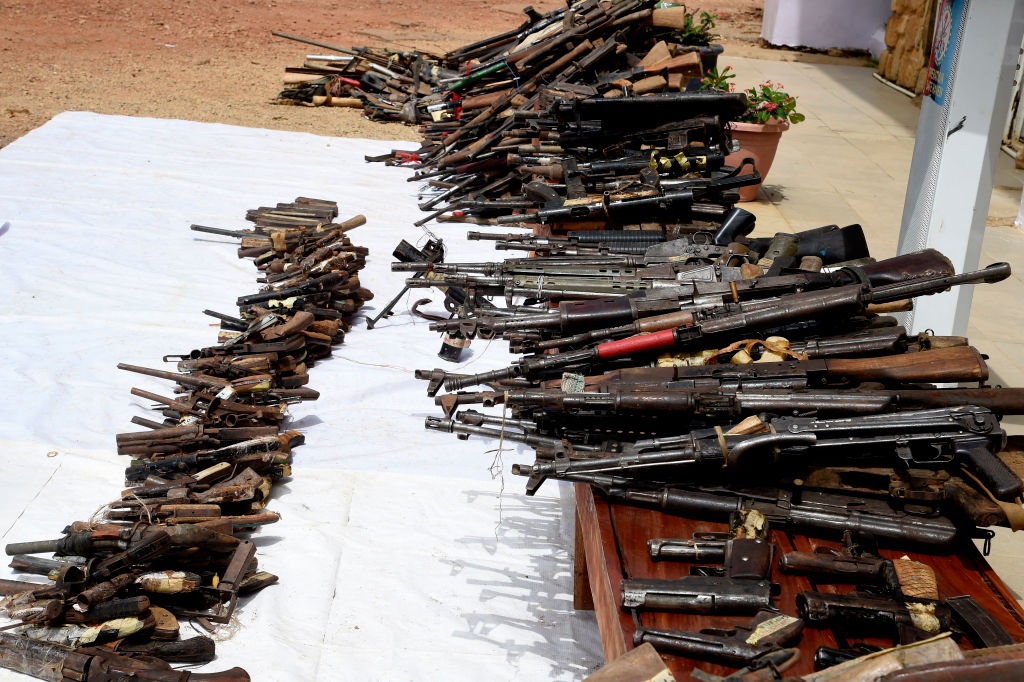A surge in gun violence is sweeping across Ghana, with reported incidents more than tripling between the first and second quarters of 2025. In response, Ghanaian authorities are calling for tighter regulations for guns and gun makers.
“The rising number of gun-related incidents and the types of weapons identified at crime scenes paint an alarming picture which demands an all-inclusive approach and a robust and more effective legal framework on arms,” Ghana’s National Commission on Small Arms and Light Weapons wrote in a recent statement.
The commission reported 54 gun-related incidents in the second quarter compared to 15 in the previous quarter, a 260% increase. Officials reported gun crimes in 11 of Ghana’s 16 regions. Ashanti region, the country’s second-most populous, recorded nearly 40% of the gun incidents, followed by Eastern and Upper East. The Upper East region borders Burkina Faso and Togo.
Experts say Ghana’s surge in deadly violence is driven by weapons traffickers flooding the country with small arms, particularly from Burkina Faso. Many of those weapons are flowing into Bawku in Upper East region where ethnic divisions have driven local conflict and violence among youth groups, according to researchers with ENACT.
Some of the trafficked weapons are among the 200,000 a year created by Ghana’s artisanal gun makers. Although it is illegal to produce weapons locally, Ghana has one of the most sophisticated craft weapons industry and trafficking networks in the sub-region. Many of the guns flow from Ghana into neighboring countries, potentially circling back later to fuel conflict within Ghana’s own borders.
“This poses a serious threat to the country’s security and stability, encouraging crime and prolonging regional conflicts, which undermine government and impede socio-economic advancement,” researchers from ENACT wrote in an analysis of gun proliferation in Ghana.
According to ENACT, illicit gunsmiths are often blacksmiths who pass their knowledge down along generational lines or to apprentices. Making guns is more lucrative than their usual work making cooking utensils. Other weapons and ammunition appear to have been stolen from the military, according to Ghanaian authorities.
Adam Bonaa, executive secretary for Ghana’s weapons commission, told Modern Ghana his organization is working with other government agencies, including the military, to determine the origin of the weapons captured at crime scenes and “bring them to book.”
Ghana’s Interior Minister Mohammed-Mubarak Muntaka has called for collaboration between government agencies and the public to track the flow of arms into and around the country. He has promoted the use of advanced technology to detect and prevent illegal imports.
Since 2019, Ghana has used a coding system to track gun ownership by both civilians and security forces. In 2024, Ghana became part of the United Nations’ Saving Lives Entity, a program to address armed violence and illicit small arms and light weapons trafficking.
Analysts say Ghana should consider licensing blacksmiths as a way to track the production of illicit weapons. In July, Bonaa called for updating Ghana’s 50-year-old gun laws, after a student at a Northern Region high school was killed by a stray bullet from a nearby festival.
Deputy Minister for the Interior Ebenezer Okletey Terlabi has said national gun regulations are needed to address vulnerabilities in Ghana’s current system.
“Our resolve must match the urgency of making Ghana a gun violence-free and safe country,” Terlabi told a review meeting of the National Arms Bill in July.

